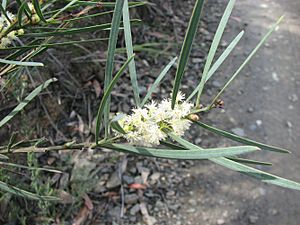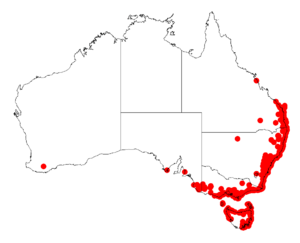Sweet wattle facts for kids
Quick facts for kids Sweet wattle |
|
|---|---|
 |
|
| Acacia suaveolens at Anglesea Heath, Victoria | |
| Scientific classification |
|
| Kingdom: | Plantae |
| Clade: | Tracheophytes |
| Clade: | Angiosperms |
| Clade: | Eudicots |
| Clade: | Rosids |
| Order: | Fabales |
| Family: | Fabaceae |
| Clade: | Mimosoideae |
| Genus: | Acacia |
| Species: |
A. suaveolens
|
| Binomial name | |
| Acacia suaveolens |
|
 |
|
| Occurrence data from AVH | |
| Script error: The function "autoWithCaption" does not exist. | |
| Synonyms | |
|
|
Script error: No such module "Check for conflicting parameters".
The Acacia suaveolens is also known as the sweet wattle. It is a type of shrub that grows only in Australia. This means it is endemic to Australia.
This plant can grow from about 0.3 to 3.5 meters tall. It has smooth bark that can be purplish-brown or light green. Its leaves are actually flattened stems called phyllodes. These phyllodes are usually blue-green and can be straight or slightly curved.
The sweet wattle produces pale yellow to almost white flowers. These flowers are shaped like small balls. They usually appear between April and September in Australia. After the flowers, the plant grows flat, bluish pods. These pods are about 2 to 5 centimeters long and 8 to 19 millimeters wide.
Discovery and Naming
The sweet wattle was first officially described in 1791. An English botanist named James Edward Smith wrote about it. He saw a plant growing at Syon House in England. This plant had grown from seeds sent from New South Wales, Australia. Another botanist, Thomas Hoy, had grown it.
Later, in 1806, Carl Ludwig Willdenow moved the species into the Acacia group. This is the group it still belongs to today.
Where It Grows
The sweet wattle grows naturally in sandy soils. You can find it in areas called heathland. It also grows in dry sclerophyll forests. These are types of forests with tough, leathery-leaved plants.
This plant is found in several parts of Australia. These include South Australia, Victoria, Tasmania, New South Wales, and Queensland.
Growing Sweet Wattle in Gardens
The sweet wattle is a great plant for gardens. It adds a splash of color during winter. Its pale yellow flowers stand out when many other plants are not blooming. You can also use it as a low screen plant. This means it can help block views or define areas in a garden.
 | Janet Taylor Pickett |
 | Synthia Saint James |
 | Howardena Pindell |
 | Faith Ringgold |

